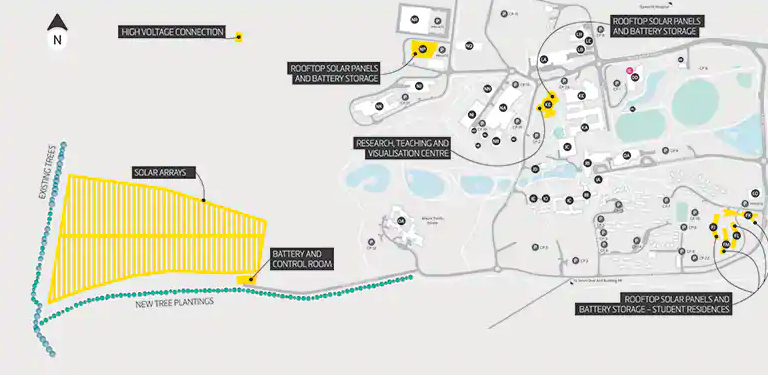A utility-scale, solar-powered microgrid at Deakin University, in Geelong, Victoria, has entered the construction phase, and is expected to be completed late this year.
The project features a 7 MW solar farm spreading across 14.5 hectares collocated with a 1 MW central battery, and integrates 0.25 MW of rooftop solar and smaller batteries across the campus. Its goal is to supplying around 54% of the University’s Waurn Ponds Campus’ current power consumption and provide an example for further research and industry engagement with renewable-centered energy systems.
To deliver the project, Deakin has partnered with Victorian electricity distributer AusNet Services and Mondo Power, an independent subsidiary of AusNet Services specialized in commercial and community distributed energy offerings.
According to Deakin, construction is set to begin as soon as possible and is being undertaken by Victorian companies which is already resulting in local employment that will raise workers’ skill levels in globally relevant jobs.
“We are experiencing growing global need for research in innovative renewable energy systems, and the demands on energy networks are changing rapidly as technology and knowledge tries to keep up with the growing shift by industry, consumers and governments towards sustainable generation and distribution,” Deakin Vice-Chancellor Professor Jane den Hollander said at the sod turning ceremony.
“Together with AusNet Services we’re looking forward to welcoming additional partners to increase our reach and impact through this innovative project.”
While it will reduce carbon emissions by an estimated 12,000 tonnes per year and generate half of the Waurn Ponds campus’ energy needs on site, supporting Deakin’s aspiration to be carbon neutral by 2030, the microgrid project will also serve as a learning ground for researchers to develop and test solutions at an industrial scale and train the next generation of energy professionals.
“The partnership between AusNet Services and Deakin University provides education and career pathways for those seeking to build, run and maintain the energy networks of the future. This micro-grid project will not only provide clean, renewable energy but also a world-class learning and education hub,“ said AusNet Services Managing Director Nino Ficca.
This is one of many efforts by Australian universities to offset emissions. While many of them have installed rooftop solar, there is a growing number of universities that have upped the ante, adding battery storage, purchasing large-scale solar farms or entering into innovative PPAs.
Other microgrid projects have been initiated by Monash University – a 4 MW PV + 1 MWh battery storage microgrid at its Clayton Campus in Melbourne, and the University of Queensland, which is developing a solar PV+battery hybrid at its maritime research stations in the Great Barrier Reef under an EPC contract inked with German developer juwi.
Deakin University is also a partner on a two-year project, alongside DNV GL, the CSIRO, and the Smart Energy Council, aiming to develop a new performance standard for distributed energy storage systems launched last year. The work behind the proposed Australian Battery Performance Standard is being funded $1.9 million from ARENA and the Victoria state government.
This content is protected by copyright and may not be reused. If you want to cooperate with us and would like to reuse some of our content, please contact: editors@pv-magazine.com.









By submitting this form you agree to pv magazine using your data for the purposes of publishing your comment.
Your personal data will only be disclosed or otherwise transmitted to third parties for the purposes of spam filtering or if this is necessary for technical maintenance of the website. Any other transfer to third parties will not take place unless this is justified on the basis of applicable data protection regulations or if pv magazine is legally obliged to do so.
You may revoke this consent at any time with effect for the future, in which case your personal data will be deleted immediately. Otherwise, your data will be deleted if pv magazine has processed your request or the purpose of data storage is fulfilled.
Further information on data privacy can be found in our Data Protection Policy.